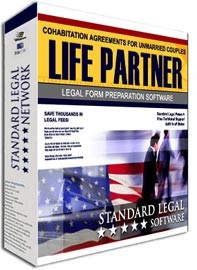You may not realize it, but, if you are living with someone to whom you are not married, you, and they, face certain legal challenges and risks which a simple Life Partner Cohabitation Agreement may resolve.Who Needs A Cohabitation Agreement?
With the recent Supreme Court rulings on gay marriage, you would think that cohabitation agreements aren't really needed any more.
By Donovan Baldwin
Well, not so, my friend.
Of course, not everyone needs a life partner cohabitation agreement, but, some specific groups of people do.
Family members, roommates, and unmarried partners who live together may need to protect their interests, and those of a loved one, with a formal cohabitation agreement.
FORMAL AGREEMENT?
Don't let the word "formal" in that last sentence get you worried. It just means a specific, written, and signed agreement. It's easy to do with a high-quality, yet inexpensive, life partner cohabitation agreement kit, and, it costs less than $50 to potentially save thousands of dollars, not to mention protecting both partners.
WHAT IS A COHABITATION AGREEMENT?
A cohabitation agreement is nothing more than a written contract, or "agreement", entered into by two people who are, or are going to be, living together.
It addresses, in advance, a range of potential financial and/or property issues that may come up during the cohabitation, or relationship of the parties. The cohabitation agreement also helps resolve issues which may arise if the relationship ends. After all, just as with a will, reaching agreement on these difficult issues is easier before they arise, and while the parties are still amicable, and not involved in disagreements or personal difficulties which can distort their decision making efforts, can ease the stress and anxiety that often arises should the relationship end.
THE ADVANCED MEDICAL DIRECTIVE
Since many people living together are close family members, or are in a close personal relationship, often being the closest human connections for each other, including an advanced medical directive in the cohabitation agreement is potentially very important. Adult children caring for their parents, or, parents caring for a grown child will find this especially important.
LAST WILL AND TESTAMENT
In most instances, people living together outside of marriage will have no legal claims on property in the event of the death of their partner or family member. Quite often, what they considered "community property" is actually part of the other's estate. It is important to set out in writing specifically the desires of each party so that, in the event of the death of one of them, the other will at least be able to go on living as they have before without loss of income or property which they thought of as their own.
QUITCLAIM AND SURVIVORSHIP DEEDS
Along those same lines, a cohabitation agreement should, in the event of ownership of property, provide for the smooth, legal transition of ownership in the event of the death of the other partner....even if both partner's names are on the deeds and documents.

|
Cohabitation Legal Forms Software Kit
Web Page Copyright 2024 by Donovan Baldwin |


